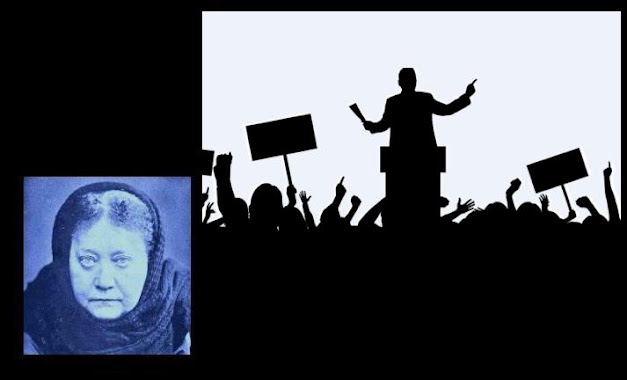She was
affirming this on several occasions:
In The
Theosophist magazine, October 1879, she wrote:
« Unconcerned about politics; hostile to the insane
dreams of Socialism and of Communism, which it abhors—as both are but disguised
conspiracies of brutal force and sluggishness against honest labour; the
Society cares but little about the outward human management of the material
world. The whole of its aspirations are directed toward the occult truths of the
visible and invisible worlds.
Whether the physical man be under the rule of an
empire or a republic, concerns only the man of matter. His body may be
enslaved; as to his Soul, he has the right to give to his rulers the proud
answer of Socrates to his Judges. They have no sway over the inner man. »
(p.6-7)
In The
Theosophist magazine, May 1883, she wrote:
«
During the whole period of our four years’ living in
India, neither our Society, nor its Founders, nor this Journal had anything to
do whatever with politics. Nay, feeling an innate and holy horror for
everything connected with it, we have avoided the subject most strenuously. Empires
might have fallen down and arisen anew during that interval, but still our
Journal as ourselves would not have heeded the catastrophe but given ever our
undivided attention to “Occult Truths” and kindred metaphysical problems. »
(p.206)
In the
London newspaper Pall Mall Gazette,
January 1889, faced with accusations of being a Russian spy, Blavatsky
responded:
«
I have never written, in all my life on politics, of
which I know nothing. I take no interest in political intrigues, regarding them
as the greatest nuisance and a bore, the falsest of all systems in the code of
ethics. I feel the sincerest pity for those diplomats who, being honorable men,
are nevertheless obliged to deceive all their lives, and to embody a living,
walking LIE.
Ten years ago, the Anglo-Indian
Government, acting upon a false and malicious insinuation, mistook me for a
spy; but after the Police had shadowed me for over eight months—without
unearthing a trace of the charge brought against me—it found to its great
sorrow that it had made an April-fool of itself. Yet the Anglo-Indian
Government acted, after that, in the most honorable way.
In November, 1876, Lord Lytton
issued an order to the Political Department that Colonel Olcott and myself
should be no longer subjected to the insulting surveillance of the Anglo-Indian
Police. [Vide the Allahabad Pioneer, November 11, 1879.] From that day we were
no longer annoyed.
. . .
Let the Press inquire, from
themselves or their Secretaries, whether it has been ever proven by any of
their respective Governments that I was a political agent, whatever may be the
malicious society gossip of my enemies. Nor do I feel so certain yet, unless
this disgraceful rumor is sufficiently refuted, that I will not appeal directly
to the justice and honor of these three noblemen. Noblesse oblige.
The least of beggars has a right
to seek redress from law, and to appeal to the evidence of the highest in the
land, if that evidence can save his honor and reputation, especially in a case
like this, when truth can be made known with one simple word from these high
witnesses—a yea or a nay.
I say it again, Miss de Grasse
Stevens and her publishers stand accused of an uncalled for libel. I may or may
not be endowed by nature with the potentiality or even the commission of every
mortal sin. But it so happens that I have never meddled in politics, am innocent
of any knowledge of political intrigues, never bothered myself with this
special science at any time of my long life, and that ‘where there is nothing,
the King himself loses all rights.’ The ‘spy’ charge was thus at all times a
mare’s nest.
In closing I would offer a bit of
advice to my last slanderer. Since the authoress of Miss Hildreth [the authoress was Miss A. de Grasse Stevens] seems chronically afflicted with the political microbe, let her try her
hand at something she knows more about than subterranean Russia and its agents.
Her book is not only libelous, it is absurd and ridiculous. To make Count
Melikoff talk in a drawing-room of our ‘little Father’ (read the Tzar!!!) is as
correct as it would be to address Miss Stevens au sérieux as ‘the great
Mother-Squaw’ in London. »
(p.7)
~*~
And also the facts show that Blavatsky abhorred
politics since throughout her life she never got involved in political affairs.

No comments:
Post a Comment